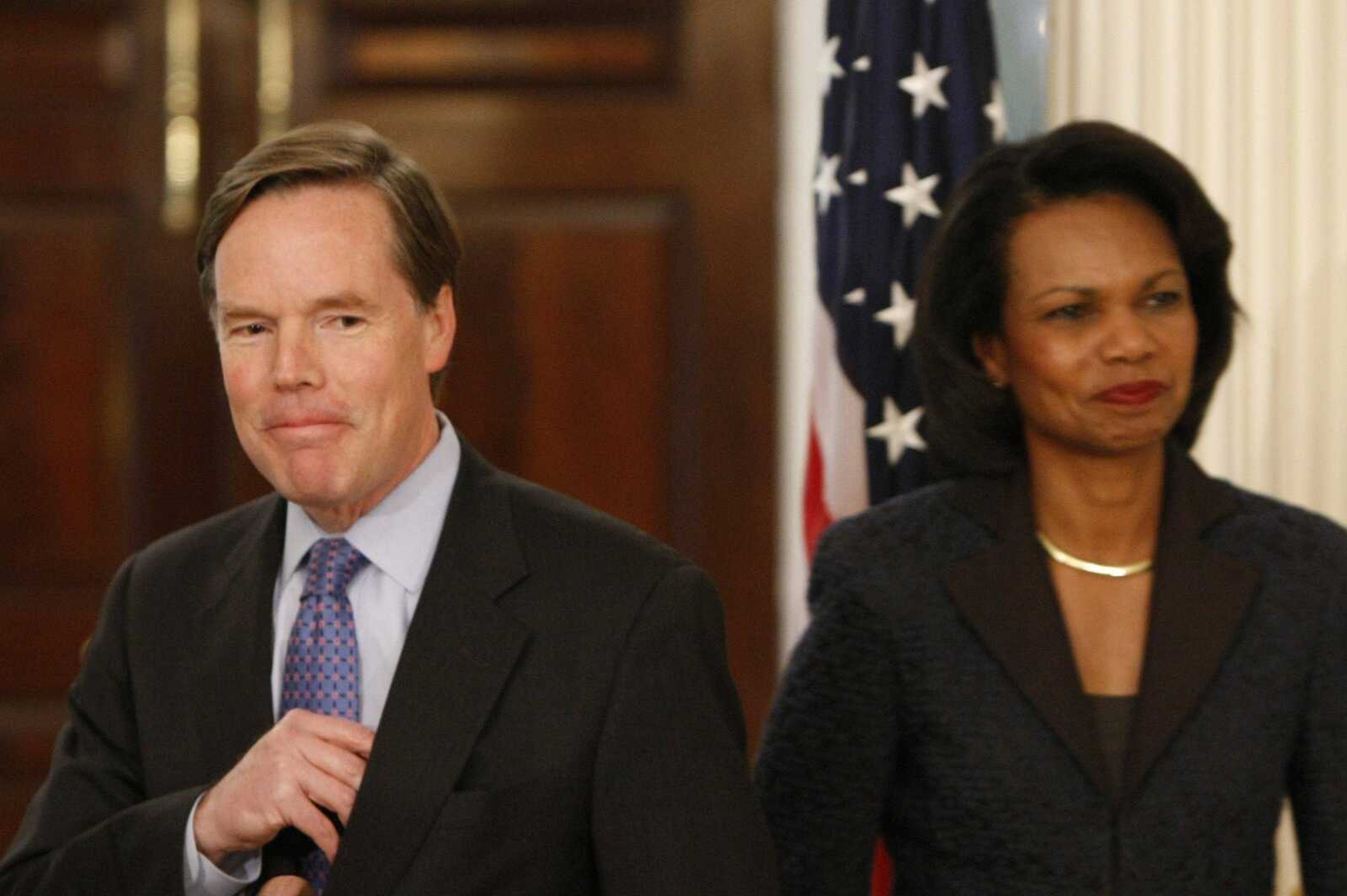Bush fills Iran policy void as State Department exodus continues
WASHINGTON -- President Bush moved quickly Friday to fill a key diplomatic post with responsibility for Iran policy, nominating the American ambassador to Russia for the job immediately after his predecessor's resignation. Bush tapped William Burns less than three hours after the State Department's third highest-ranking official, undersecretary of state for political affairs Nicholas Burns, announced he was joining a growing exodus of senior diplomats stepping down...
WASHINGTON -- President Bush moved quickly Friday to fill a key diplomatic post with responsibility for Iran policy, nominating the American ambassador to Russia for the job immediately after his predecessor's resignation.
Bush tapped William Burns less than three hours after the State Department's third highest-ranking official, undersecretary of state for political affairs Nicholas Burns, announced he was joining a growing exodus of senior diplomats stepping down.
The unusually speedy decision is a sign of the importance the Bush administration attaches to containing Iran.
"President Bush has every confidence that Ambassador Burns will approach his new duties with the same energy that he has demonstrated in Moscow and throughout his long and effective diplomatic career," the White House said in a statement that thanked Nicholas Burns for his years of service.
William and Nicholas Burns are not related.
Before moving to Moscow in 2005, William Burns was the top U.S. diplomat for the Middle East. If confirmed by the Senate, he will inherit most of his predecessor's duties, notably Washington's push to impose new U.N. sanctions on Iran over its nuclear program, said State Department spokesman Sean McCormack.
That effort has stalled in the face of Russian and Chinese resistance in the U.N. Security Council as well as a recent U.S. intelligence report that concluded Tehran had stopped its nuclear weapons program in late 2003 and has not resumed it. Iran says it never had such a weapons program.
William Burns' experience in Russia was one reason Secretary of State Condoleezza Rice recommended him for the new post, McCormack said, joking that the administration had decided to "substitute one Burns for another."
Nicholas Burns, who said he will join the private sector in March for family reasons, is the most senior of at least 19 top State Department officials to have resigned or retired since December 2006 as Bush's second term nears an end.
Many vacancies have remained open for weeks and months. The speed with which Bush announced his choice to replace the man with the Iran portfolio was telling.
On Capitol Hill, several lawmakers offered high praise for Nicholas Burns, saying he had served with distinction.
William Burns, who has won Senate confirmation for earlier jobs, is not expected to face opposition, but Democrats are expected to use his nomination to raise questions about Bush's Iran policy.
The outgoing Burns has led the U.S. drive to adopt a third U.N. sanctions resolution on Iran, speaking almost daily with his counterparts from the four other permanent Security Council members -- Britain, China, France, Russia -- and Germany to negotiate a text.
At a ceremony to announce his retirement after a 26-year foreign service career, Rice paid tribute to a man she called a friend she has known for almost two decades.
"He has been the consummate diplomat serving on behalf of the United States in some of our most difficult circumstances, working on some of our most difficult issues," she said.
Aside from Iran, those issues have included negotiating a controversial civilian nuclear deal with India, leading security talks between the United States and Israel and dealing with the complicated Balkans, particularly the issue of the Serbian entity of Kosovo, which intends to soon declare independence in a move strongly opposed by Serbia and Russia.
Rice said that, after leaving, Burns had agreed to continue "to work on the India file, particularly because we would like to push the U.S. civil nuclear agreement to conclusion."
William Burns, 51, a former assistant secretary of state for Near Eastern Affairs and ambassador to Jordan, joined the foreign service in 1982 and has worked in senior policy planning posts at the State Department as well as at the National Security Council in the administration of the first President Bush.
Nicholas Burns, also 51, who also has served as the State Department spokesman, said he was leaving because it's "time for me to meet my obligations to my wife and three daughters, and it's time to pursue other ventures outside the government."
Officials who know him discounted speculation he might seek elected office in his home state of Massachusetts.
His resignation is the latest in a series of recent departures from the State Department, including three undersecretaries of state and four assistant secretaries, most of whom are returning to academia or business ventures.
Three officials have left under heavy criticism for Iraq-related issues: the head of the department's Overseas Building Operations, Charles Williams, Inspector General Howard Krongard and Diplomatic Security chief Richard Griffin.
Another, Randall Tobias, the director of the U.S. Agency for International Development, resigned after being implicated in the investigation of an alleged prostitution ring in Washington.
Connect with the Southeast Missourian Newsroom:
For corrections to this story or other insights for the editor, click here. To submit a letter to the editor, click here. To learn about the Southeast Missourian’s AI Policy, click here.









